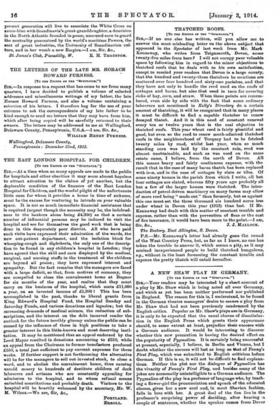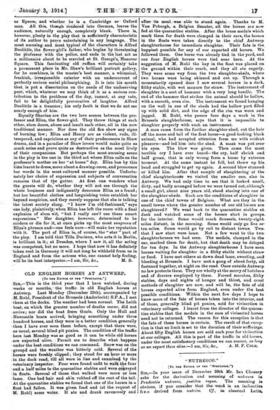A NEW SHAW PLAY IN GERMANY.
[To rue EDIT= or THE ..svranaret.-1 Sra,—Your readers may be interested by a short account of a play by Mr. Shaw which is being acted all over Germany, and which as yet has been neither performed nor published in England. The reason for this is, I understand, to be found in the German theatre managers' desire to secure a play from Mr. Shaw that had not been previously condemned by the English critics. Popular as Mr. Sham's plays are in Germany, it is only to be expected that the usual chorus of dissatisfac- tion in the English Press which greets their appearance should, to some extent at least, prejudice their success with a German audience. It would be interesting to discover whether this new precaution is having the desired effect on the popularity of Pygmalion. It is certainly being successful at present, especially, I believe, in Berlin and Vienna, but I doubt whether the success will last at long as that of Fanny's First Play, which was submitted to English criticism before German. If this is so, it will not be difficult to find explana- tions. Neither the plot nor the dialogue of Pygmalion has the vivacity of Fanny's First Play, and besides many of the jokes are necessarily unintelligible to a German audience. The Pygmalion of the play is a professor of language who, by teach- ing a flower-girl the pronunciation and speech of the educated classes, gives her a new soul and, in most Shavian fashion, falls in love with her. A great deal of the fun lies in the professor's surprising power of deciding, after hearing A couple of sentences, whether the speaker comes from Dover or Epsom, and whether be is a Cambridge or . Oxford man. All this, though rendered into German, leaves the audience, naturally enough, completely blank. There . is, however, plenty in the play that is sufficiently characteristic of its author to prove entertaining in any language. . The most amusing. and Most typical, of the characters is Alfred Doolittle, the flower-girl's father, who begins by threatening the frofeesor with the police, and ends in the last act as a millionaire about to be married at St. Georges, Hanover Square., This fascinating" old ruffian will certainly- take a permanent place in Mr,, Shaw's brilliant portrait gallery, for he combines, in the master's beet manner, a whiaisicai, freakish, irregionsible exterior with an undercurrent of perfectly serious social philosophising. It is into his month that is put a dissertation on the needs of the undeserving poor, which, whatever we may think of it as a serioue con- tribution to the problems of. the day, cannot, at any rate, fail to be delightfully provocative of laughter. Alfred Doolittle is. a treasure; his only fault is that we do not see nearly enough of him.
Equally Silesian are the two love scenes between the pro- fessor and Eliza, the flower-girl. They throw things at each other, slam doors, abuse and insult each other, all in the now traditional manner. Nor does the old fire show any signs of burning low ; Eliza and Henry are as violent, rude, ill- tempered, and capricious as any of their predecessors in Shaw drama, find in a paradise of Shaw lovers would make quite as much noise and prove quite as destructive as the most lively of their companions. But perhaps the most amusing scene, in the play is the one in the third act where Eliza calls on the professor's mother on her "at home" day. Eliza has. by this tithe learnt to dress, move about a drawing-room, and pronounce her words in the most cultured manner possible. Unfortu- nately her choice of expression and subjects of conversation remains that of ttre gutter. At first one wonders what the guests will do, whether they will -not see through the whole buainess and indignantly denounce Eliza as a fraud; but her beautiful clothes and languishing voice establish her -beyond suspicion, and they merely suppose that she is talking the latest society sling. "I know I'm old-fashioned," says one lady, plaintively,' when Eliza has left the room with a final -exploaion of slum wit; "but I really can't use 'these smart -expressions." Her daughter, however, determined to be modern or die for it, at once picks op the most saugrenu of Eliza's phrases and—one feels sure—will make her reputation with it. The part of Eliza is, of course, the "star " part of 'the play. I am told that Tills Durieux, who acts it in Berlin, is brilliant in it ; at Dresden, where I saw it, all the acting :was competent, but no 'more. I hope that new it has definitely
• taken root in Germany it will not long be withheld from us in 'England and from the actress who, one cannot help feeling,
will be its beet interpreter.—I am, Sir, &c., IL S.



















































 Previous page
Previous page